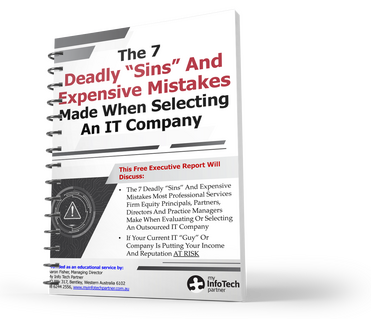 I know you are really busy and don't have time for this right now. I know it seems like almost daily you're getting bombarded with things you must know or things you must do.
I know you are really busy and don't have time for this right now. I know it seems like almost daily you're getting bombarded with things you must know or things you must do.
I too have felt the same way. Being a business owner or business manager, your responsibilities are endless and sometimes you feel like putting your head in the sand or quitting. You’re either busy with your family duties, practicing your profession, finding more client work, finding new clients or trying to find good employees to help you get the client work done.
You probably roll your eyes every time you get an email from a Nigerian prince, asking you to transfer $25,000 to their bank account. Isn’t it also amazing (and highly coincidental) how you win the lottery from a foreign country on a weekly basis?
While the above scenarios may be obvious as a scam to some, around 90% of all data breaches and cyber-attacks start from a phishing email that someone fell for.
Phishing is when an attacker sends out a message or email asking the recipient to provide some type of secure information or perform an action. Most often, they are looking to obtain your email address and password. Other times they will link to malicious software that leads to an attack that holds the firm or company to ransom.
Major technology vendor, Cisco, reports at least one person clicks on a phishing link in 86% of organisations.
So really, a phishing attempt might not be as obvious as you think. And even if you catch it, what about ALL the employees at your firm or company? Would they be able to decipher the difference between a phishing email and a normal email? All it takes is one click on one email to unleash a cyber-attack in your business, which in some cases, may cause you to have to close your doors for good.
These are the top seven signs you (and your employees) should look for in any email that are warning signs or red flags.
- Be wary of email attachments coming from known and unknown senders. Especially if there are any of the other warning signs also in the email.
- Be wary of supposed links to Word documents, Excel spreadsheets, PowerPoint presentations, PDF files from unknown or known senders using or pretending to use online file sharing services such as Dropbox, OneDrive, SharePoint Online, Adobe Cloud, Google Drive, Box and the list goes on.
- Apply context to emails received at all times. For example. Ask yourself Am I expecting this person to send this to me at this time? If you’re not sure pick up the phone and call them to verify on a public number, not one in the email.
- Unusual requests. Is someone you know, possibly your boss or manager asking you to send them gift cards or send them personal information such as tax file numbers and date of births? This is another common recent technique to scam money, especially the gift card strategy.
- Is there grammatical or spelling errors? Is punctuation missing? Are certain words not quite how they should be? Does it seem like it was written by someone for whom English is a second language?
- Does the sender’s name and email address match? It’s common in phishing emails for these to differ, especially if the organisations email system has been correctly configured to prevent “spoofing” of emails. Are they trying to impersonate key stakeholders or firm leaders from free email addresses or external email addresses?
- Is there an urgent action you need to take? Often there will be urgency to take action due to email deliverability issue or something like this. They are using our human psychology against us, to get us to act in haste.
If you're unsure of an email reach out to us and we’d be happy to help with an independent assessment.
Naturally, all the seven warning signs are preventable, which given their impact, should be boiling your blood. As a business owner I know it does mine. I know you’re busy with other priorities and this is not something you enjoy. Would it be inconsiderate to ask when does it become irresponsible to not inspect what you expect?
Want help preventing reputation damage, protecting your family’s livelihood and ensuring you don’t fall victim to a phishing email or cyber-attack? Click here www.myinfotechpartner.com.au/initialconsult/ or give us a call on 08 6244 2556 to schedule a quick initial consultation call today.
My Info Tech Partner is a trusted IT Services and IT Support provider in Perth that specialises in protecting reputations and family’s livelihoods with advanced cyber security services for legal, accounting and financial services firms and is the only one that offers a $10,000 “Never Pay the Ransom” Guarantee.





 Contact Us On
Contact Us On



